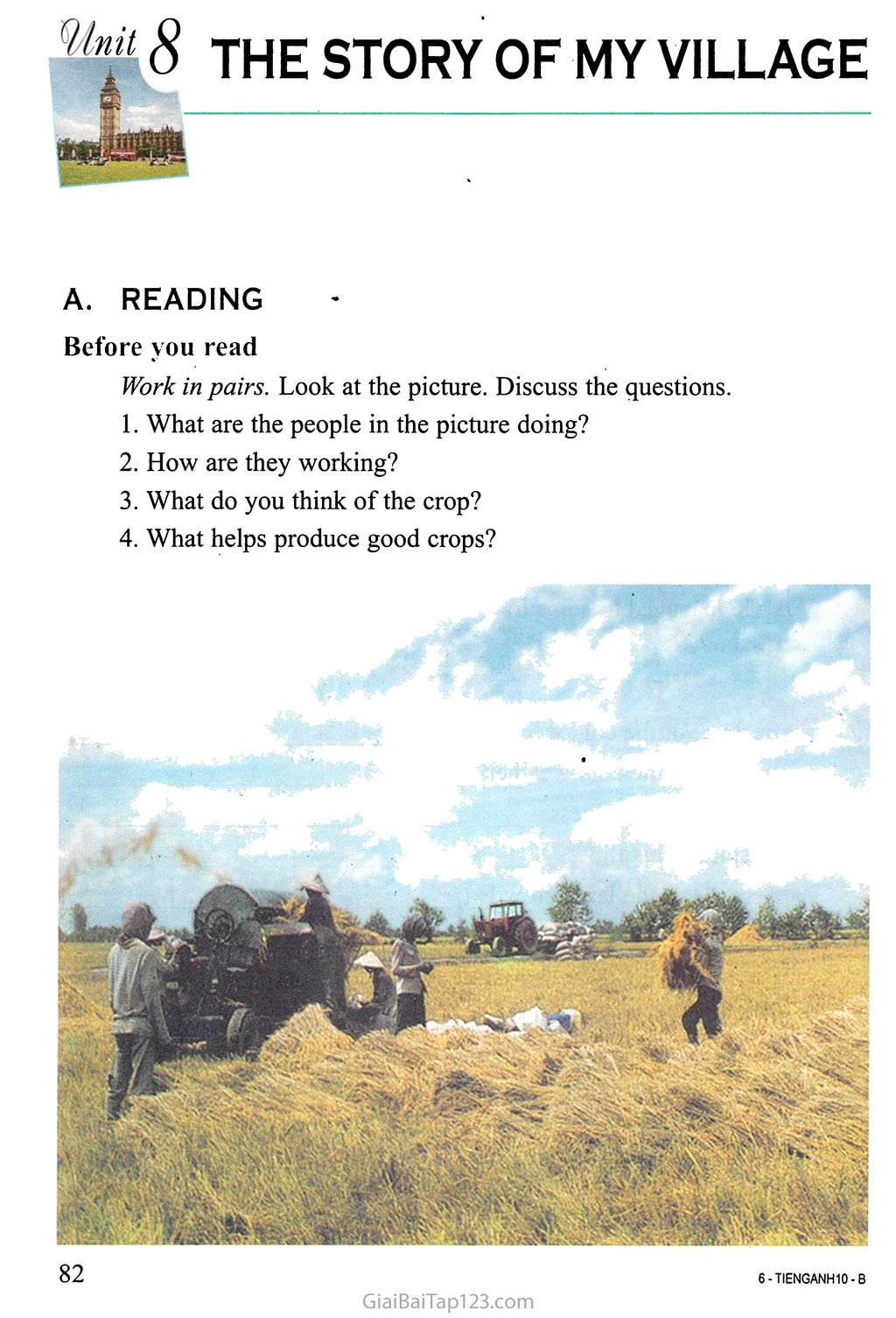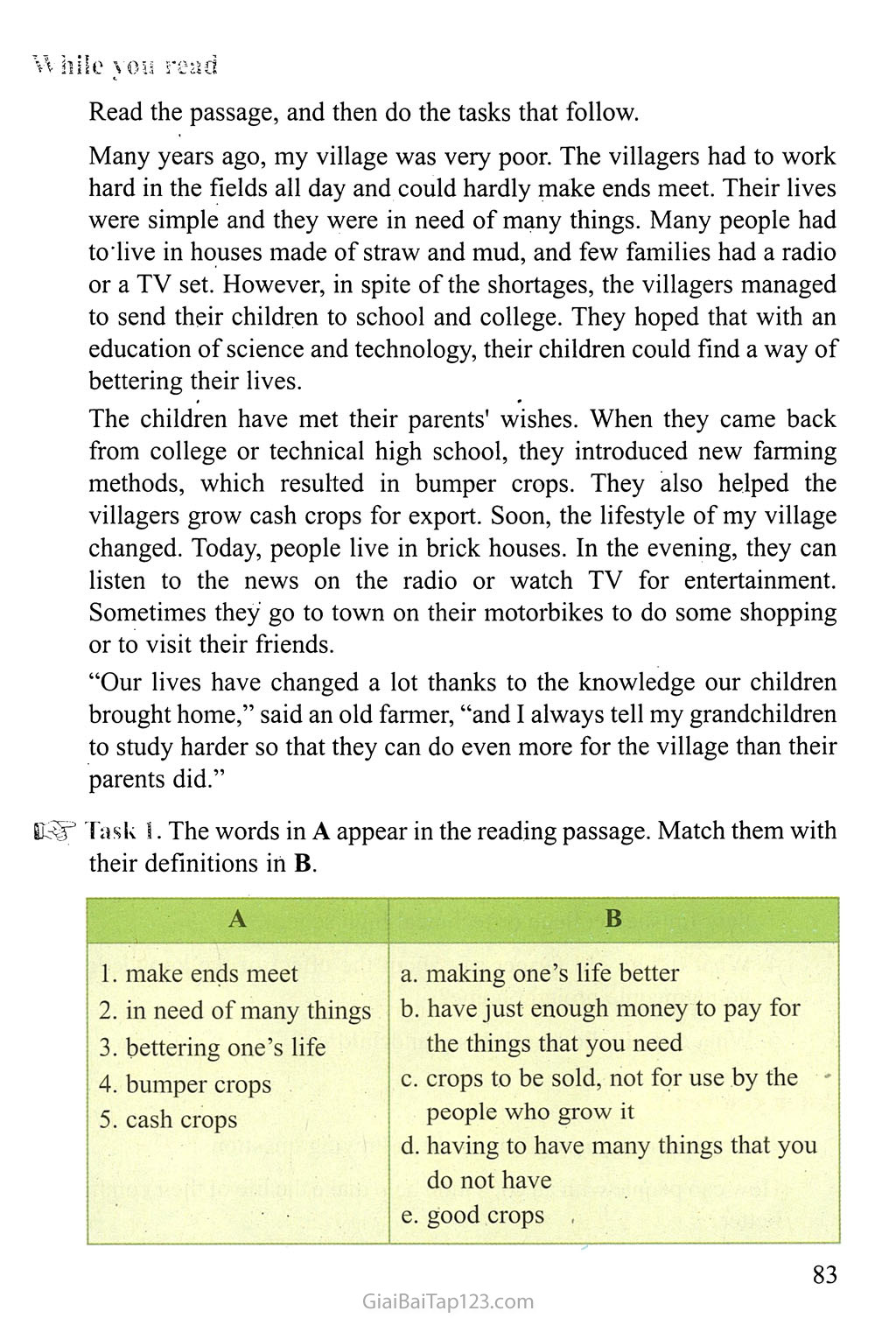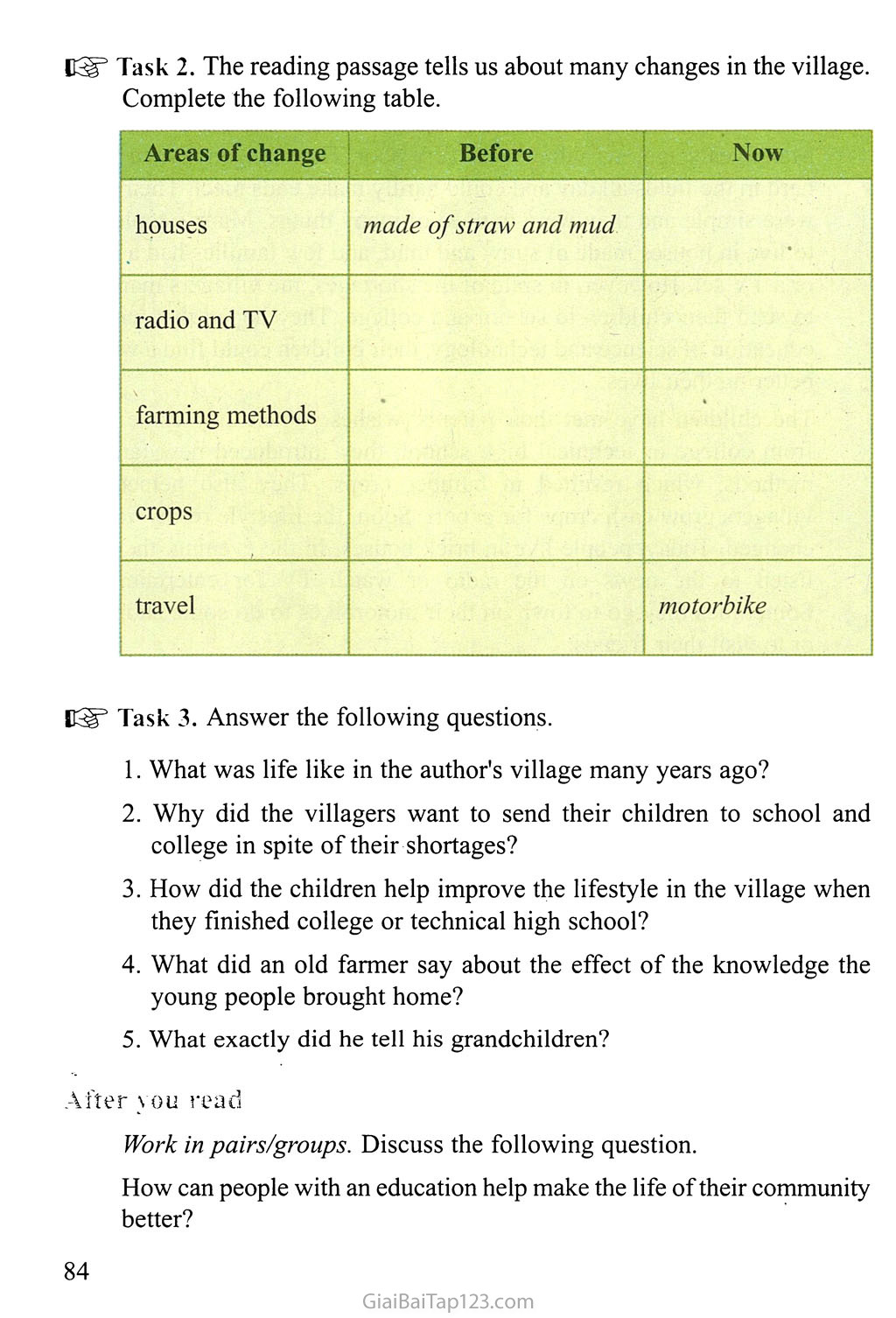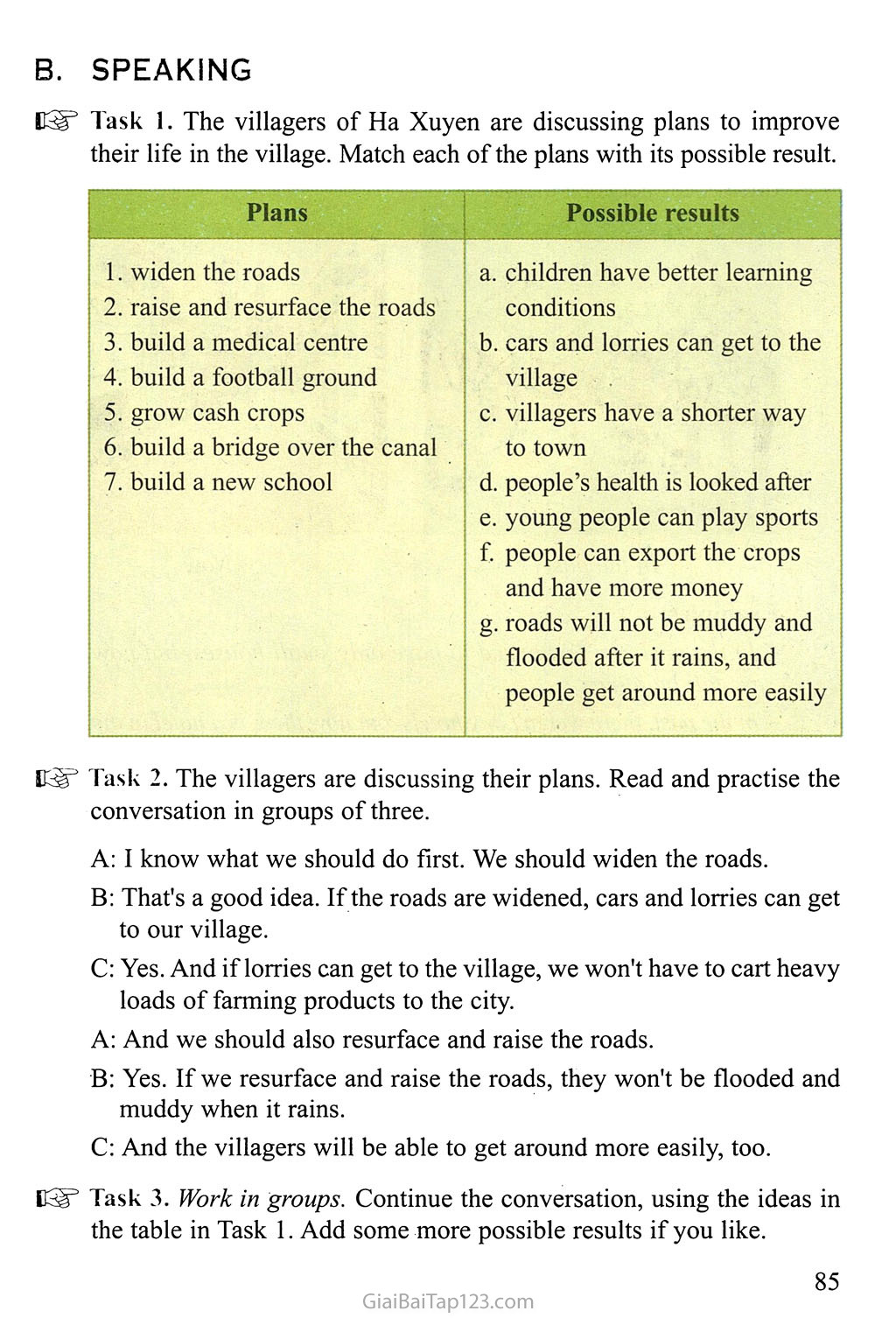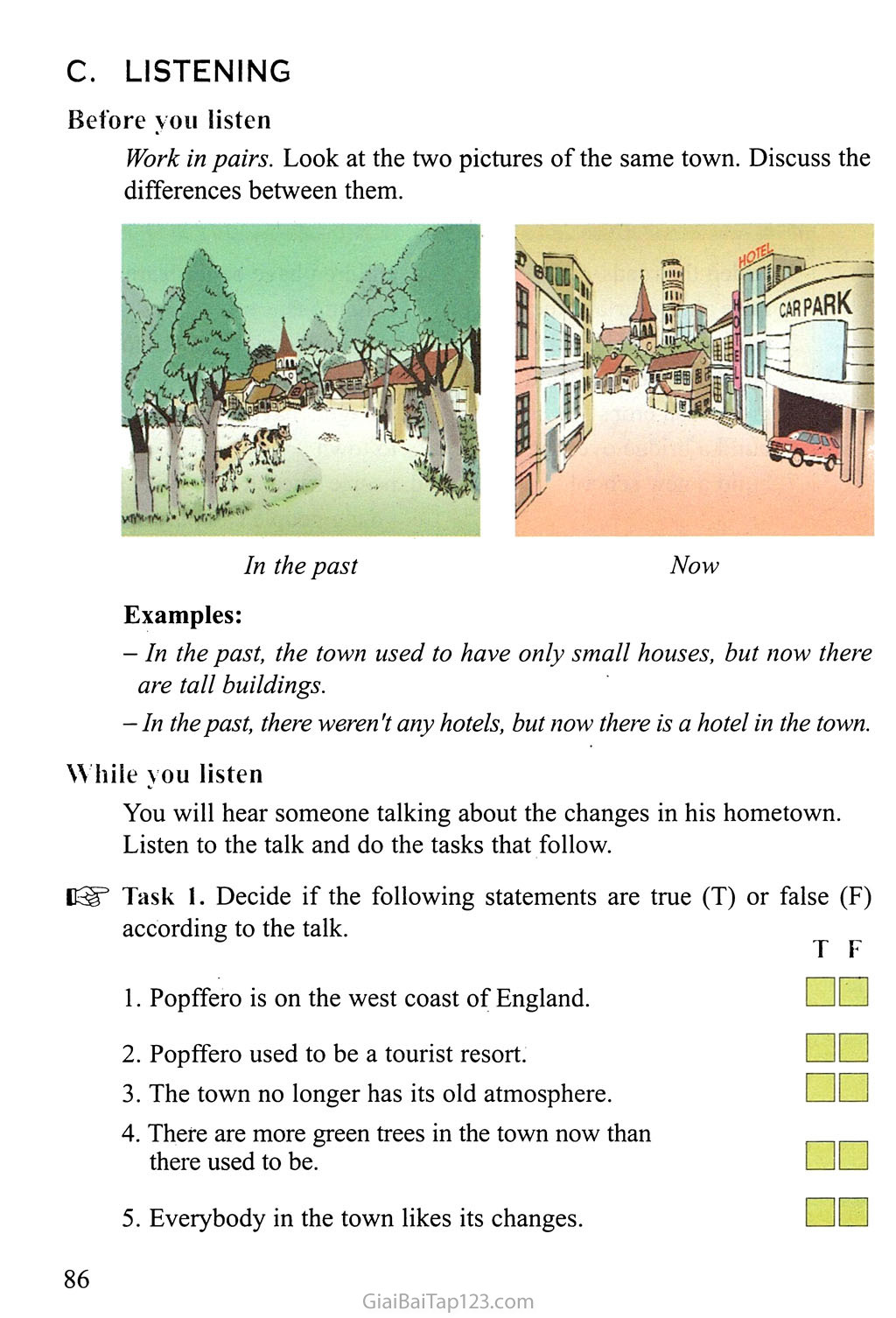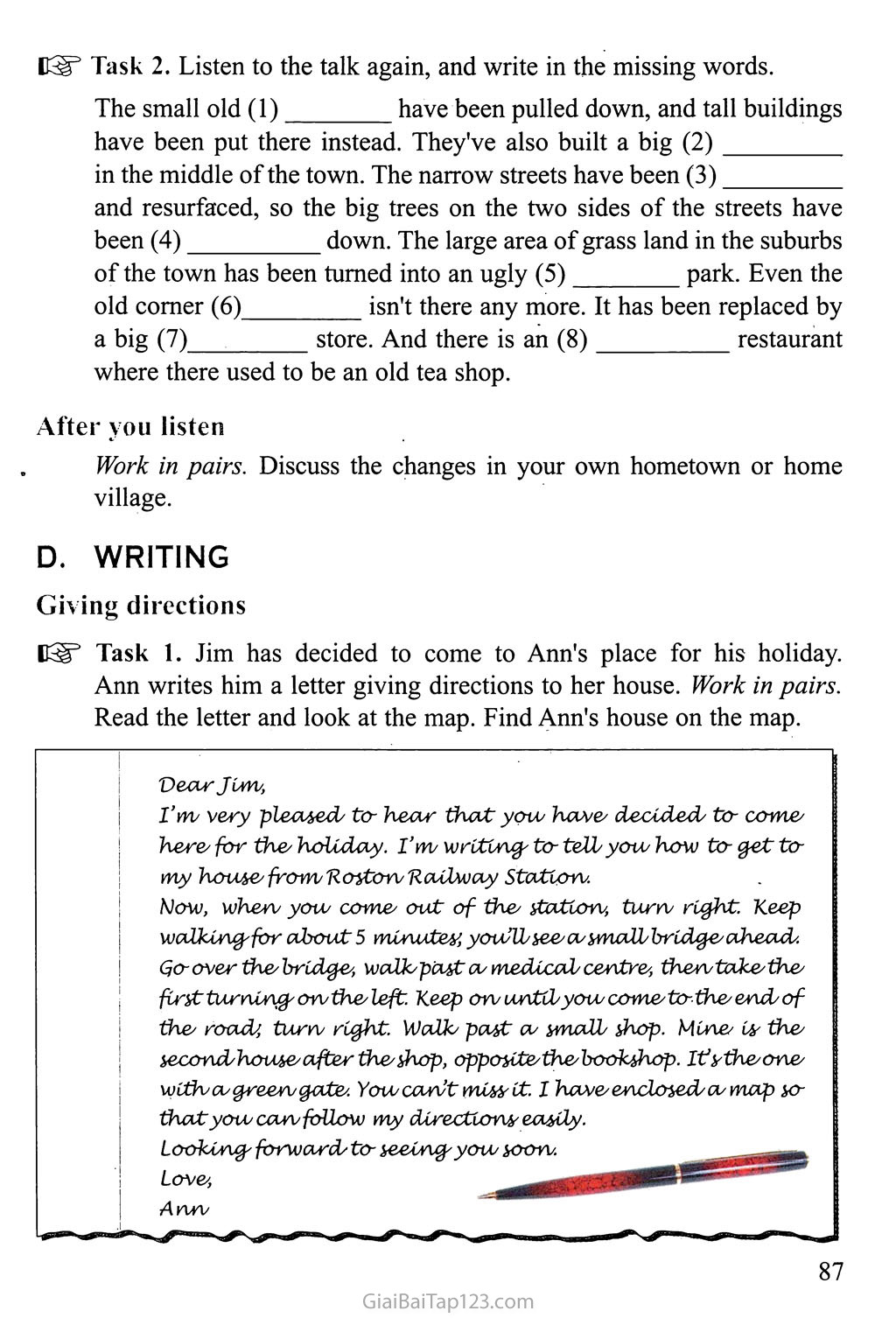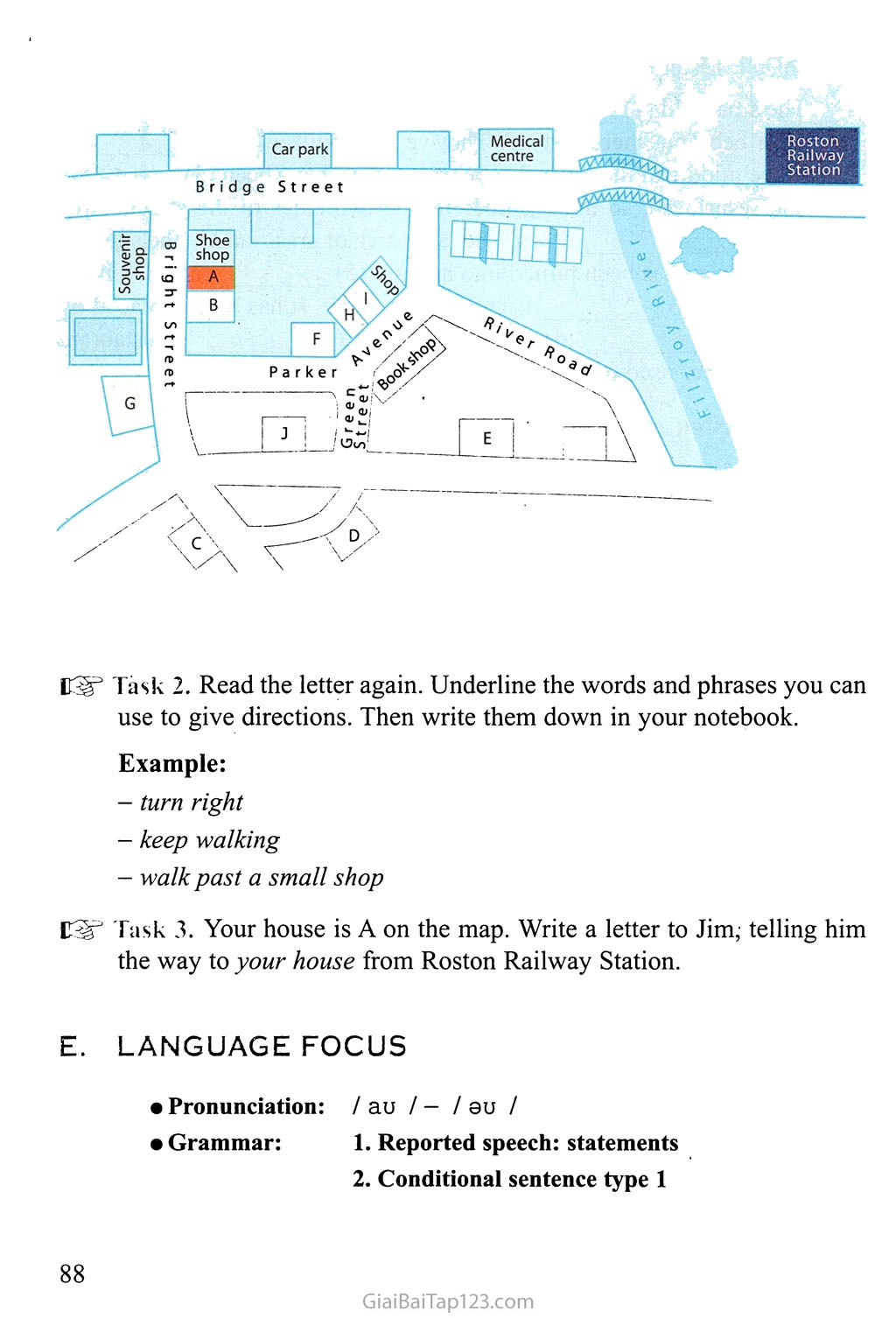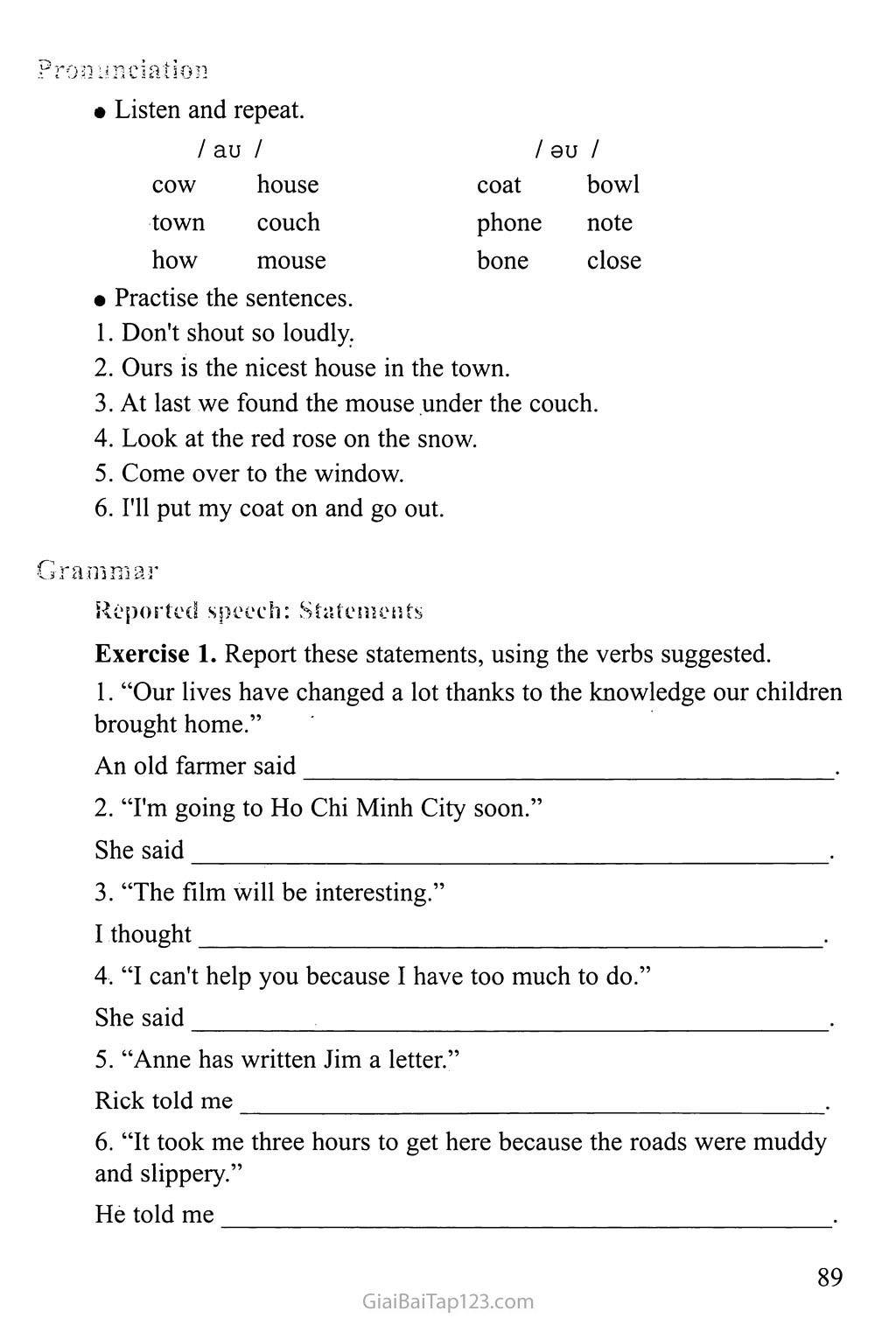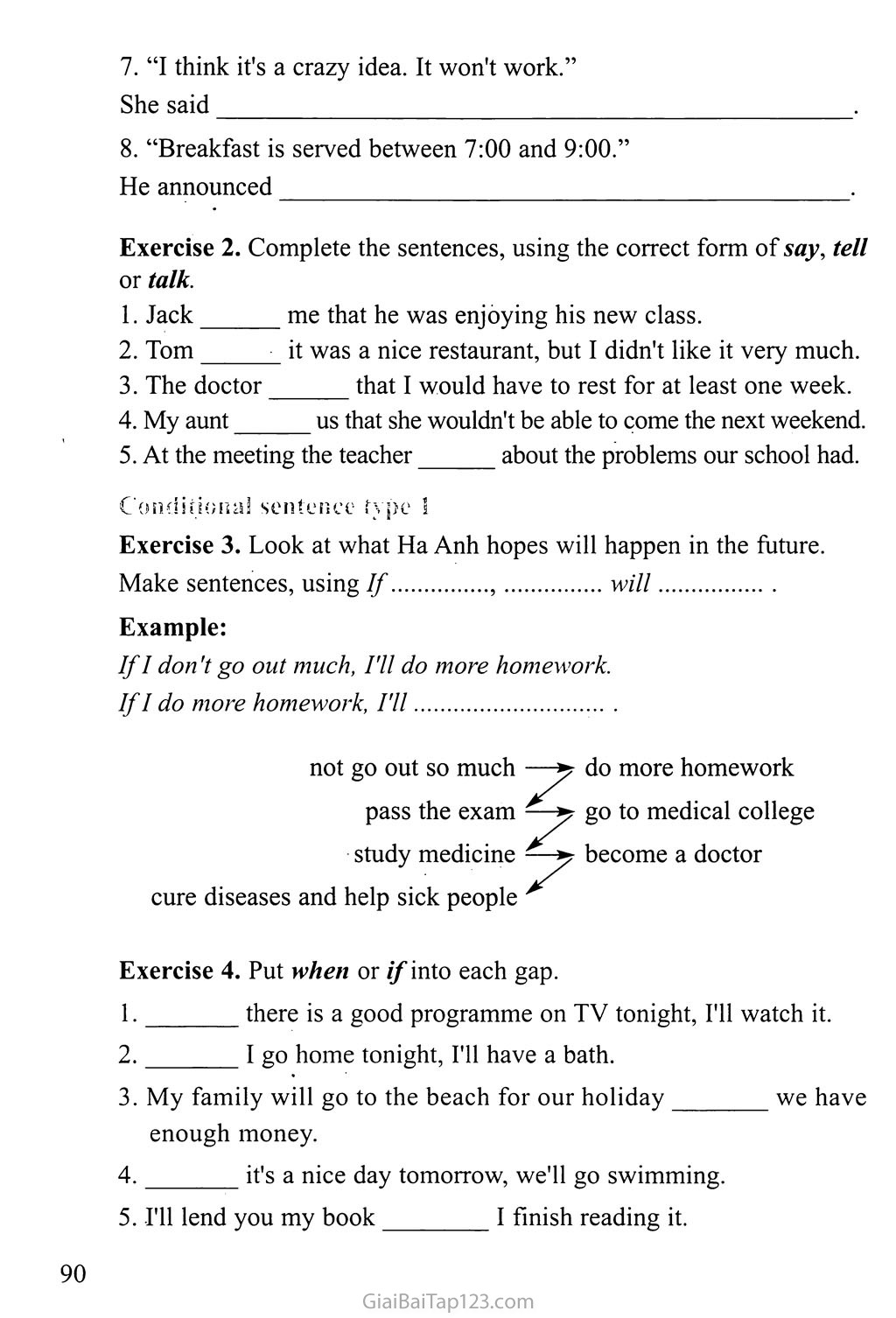SGK Tiếng Anh 10 - Unit 8: THE STORY OF MY VILLAGE
THE STORY OF MY VILLAGE A. READING Before you read Work in pairs. Look at the picture. Discuss the questions. What are the people in the picture doing? How are they working? What do you think of the crop? What helps produce good crops? 82 6-TIENGANH10-B While you read Read the passage, and then do the tasks that follow. Many years ago, my village was very poor. The villagers had to work hard in the fields all day and could hardly make ends meet. Their lives were simple and they were in need of many things. Many people had to live in houses made of straw and mud, and few families had a radio or a TV set. However, in spite of the shortages, the villagers managed to send their children to school and college. They hoped that with an education of science and technology, their children could find a way of bettering their lives. The children have met their parents' wishes. When they came back from college or technical high school, they introduced new fanning methods, which resulted in bumper crops. They also helped the villagers grow cash crops for export. Soon, the lifestyle of my village changed. Today, people live in brick houses. In the evening, they can listen to the news on the radio or watch TV for entertainment. Sometimes they go to town on their motorbikes to do some shopping or to visit their friends. “Our lives have changed a lot thanks to the knowledge our children brought home,” said an old farmer, “and I always tell my grandchildren to study harder so that they can do even more for the village than their parents did.” [Sir Task The words in A appear in the reading passage. Match them with their definitions in B. A B make ends meet in need of many things bettering one’s life bumper crops cash crops making one’s life better have just enough money to pay for the things that you need crops to be sold, not for use by the people who grow it having to have many things that you do not have good crops , Kir Task 2. The reading passage tells US about many changes in the village. Complete the following table. Areas of change Before Now houses made of straw and mild • radio and TV farming methods • > crops travel motorbike KIT Task 3. Answer the following questions. What was life like in the author's village many years ago? Why did the villagers want to send their children to school and college in spite of their shortages? How did the children help improve the lifestyle in the village when they finished college or technical high school? What did an old farmer say about the effect of the knowledge the young people brought home? What exactly did he tell his grandchildren? * After you read Work in pairs/groups. Discuss the following question. How can people with an education help make the life of their community better? B. SPEAKING Task 1. The villagers of Ha Xuyen are discussing plans to improve their life in the village. Match each of the plans with its possible result. Plans Possible results 1. widen the roads a. children have better learning 2. raise and resurface the roads conditions 3. build a medical centre b. cars and lorries can get to the 4. build a football ground village 5. grow cash crops c. villagers have a shorter way 6. build a bridge over the canal to town 7. build a new school people’s health is looked after young people can play sports people can export the crops and have more money roads will not be muddy and flooded after it rains, and people get around more easily • Kễ3 Task 2. The villagers are discussing their plans. Read and practise the conversation in groups of three. A: I know what we should do first. We should widen the roads. B: That's a good idea. If the roads are widened, cars and lorries can get to our village. C: Yes. And if lorries can get to the village, we won't have to cart heavy loads of farming products to the city. A: And we should also resurface and raise the roads. B: Yes. If we resurface and raise the roads, they won't be flooded and muddy when it rains. C: And the villagers will be able to get around more easily, too. dr Task 3. Work in groups. Continue the conversation, using the ideas in the table in Task 1. Add some more possible results if you like. c. LISTENING Before you listen Work in pairs. Look at the two pictures of the same town. Discuss the differences between them. In the past Now Examples: In the past, the town used to have only small houses, but now there are tall buildings. In the past, there weren 't any hotels, but now there is a hotel in the town. While you listen You will hear someone talking about the changes in his hometown. Listen to the talk and do the tasks that follow. inr Task 1. Decide if the following statements are true (T) or false (F) according to the talk. T F Popffero is on the west coast of England. Popffero used to be a tourist resort. I II ! The town no longer has its old atmosphere. There are more green trees in the town now than there used to be. I II I Everybody in the town likes its changes. I in KIT Task 2 Listen to the talk again, and write in the missing words. The small old (1) have been pulled down, and tall buildings have been put there instead. They've also built a big (2) in the middle of the town. The narrow streets have been (3) and resurfaced, so the big trees on the two sides of the streets have been (4) down. The large area of grass land in the suburbs of the town has been turned into an ugly (5) park. Even the old corner (6) isn't there any more. It has been replaced by a big (7) store. And there is an (8) restaurant where there used to be an old tea shop. After you listen Work in pairs. Discuss the changes in your own hometown or home village. D. WRITING Giving directions Task 1. Jim has decided to come to Ann's place for his holiday. Ann writes him a letter giving directions to her house. Work in pairs. Read the letter and look at the map. Find Ann's house on the map. Dear Jim, I’m/ very pleased tơ- hear that yợu/ have decided/ tơ come here for the holiday. I’m/ writing- tơ tell yơu/ how tơ get tơ my house from/ 7? ơắtcm/ R ailway station. How, when you/ come out of the station, turn right. Keep walklngfor about 5 minutes-; yen'll see a small bridge ahead. Qooverthebridge, walhpast O/ medical centre, thentahethe first turning- on theleft. Keep onuntilyoncemetofheendof the road; turn right. Walk/ past a/ small shop. Mine is- the second-house after the shop, opposite thebookshop. Itstheone with/a/green gate. Yon cant miss- ít. I have enclosed a/map so that yon can follow my directions-easily- looking/ forward tơ seeing-you/ soon. / ove, Ann Rost on Railway Station [dr Task 2. Read the letter again. Underline the words and phrases you can use to give directions. Then write them down in your notebook. Example: turn right keep walking walk past a small shop IKY Task 3. Your house is A on the map. Write a letter to Jim, telling him the way to your house from Roston Railway Station. E. LANGUAGE FOCUS Pronunciation: / au / - /9Ư / Grammar: 1. Reported speech: statements Conditional sentence type 1 Pronunciation • Listen and repeat. / au / / ou / cow house coat bowl town couch phone note how mouse bone close • Practise the sentences. Don't shout so loudly. Ours is the nicest house in the town. At last we found the mouse under the couch. Look at the red rose on the snow. Come over to the window. I'll put my coat on and go out. Grammar Reported speech: Statements Exercise 1. Report these statements, using the verbs suggested. “Our lives have changed a lot thanks to the knowledge our children brought home.” “I think it's a crazy idea. It won't work.” She said “Breakfast is served between 7:00 and 9:00.” He announced Exercise 2. Complete the sentences, using the correct form of say, tell or talk. Jack me that he was enjoying his new class. Tom it was a nice restaurant, but I didn't like it very much. The doctor that I would have to rest for at least one week. My aunt US that she wouldn't be able to come the next weekend. At the meeting the teacher about the problems our school had. Conditional sentence type 1 Exercise 3. Look at what Ha Anh hopes will happen in the future. Make sentences, using If , will Example: If I don't go out much, I'll do more homework. do more homework go to medical college become a doctor If I do more homework, I'll . not go out so much pass the exam study medicine cure diseases and help sick people Exercise 4. Put when or if into each gap. there is a good programme on TV tonight, I'll watch it. I go home tonight, I'll have a bath. My family will go to the beach for our holiday we have enough money. it's a nice day tomorrow, we'll go swimming. I'll lend you my book I finish reading it.

